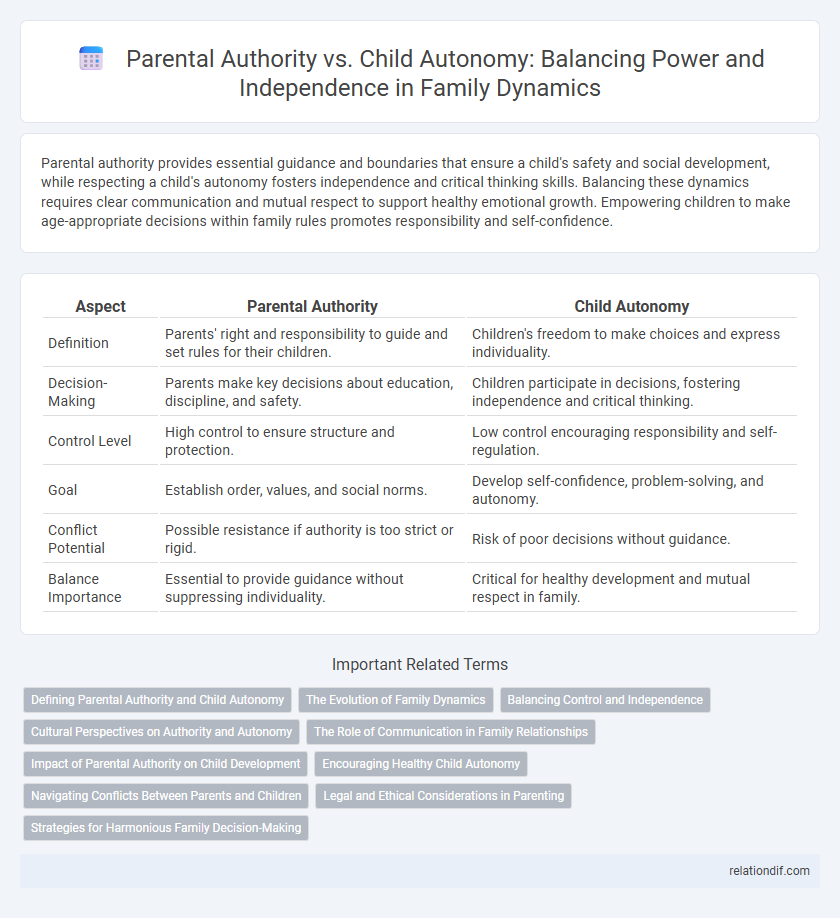Parental authority provides essential guidance and boundaries that ensure a child's safety and social development, while respecting a child's autonomy fosters independence and critical thinking skills. Balancing these dynamics requires clear communication and mutual respect to support healthy emotional growth. Empowering children to make age-appropriate decisions within family rules promotes responsibility and self-confidence.
Table of Comparison
| Aspect | Parental Authority | Child Autonomy |
|---|---|---|
| Definition | Parents' right and responsibility to guide and set rules for their children. | Children's freedom to make choices and express individuality. |
| Decision-Making | Parents make key decisions about education, discipline, and safety. | Children participate in decisions, fostering independence and critical thinking. |
| Control Level | High control to ensure structure and protection. | Low control encouraging responsibility and self-regulation. |
| Goal | Establish order, values, and social norms. | Develop self-confidence, problem-solving, and autonomy. |
| Conflict Potential | Possible resistance if authority is too strict or rigid. | Risk of poor decisions without guidance. |
| Balance Importance | Essential to provide guidance without suppressing individuality. | Critical for healthy development and mutual respect in family. |
Defining Parental Authority and Child Autonomy
Parental authority refers to the legal and moral rights parents hold to guide, discipline, and make decisions for their children's welfare, often rooted in responsibilities to ensure safety and development. Child autonomy emphasizes the growing capacity of children to make independent choices respecting their personal preferences and rights, fostering self-expression and critical thinking. Balancing these concepts requires recognizing parental authority as a framework for protection while progressively supporting child autonomy to promote individual growth and responsibility.
The Evolution of Family Dynamics
Parental authority traditionally governed family structures, with clear hierarchies dictating child behavior and decision-making. Recent shifts emphasize child autonomy, recognizing children as individuals with rights, fostering open communication and mutual respect within families. This evolution reflects broader societal changes toward egalitarian values and psychological understandings of child development.
Balancing Control and Independence
Balancing parental authority and child autonomy requires establishing clear boundaries while encouraging independent decision-making. Effective communication fosters trust, enabling parents to guide without stifling individuality. Promoting age-appropriate responsibilities helps children develop self-discipline and confidence within a safe family environment.
Cultural Perspectives on Authority and Autonomy
Cultural perspectives on parental authority and child autonomy vary significantly, influencing family dynamics and decision-making processes. In collectivist cultures, parental authority is often emphasized, with children expected to comply with family norms and expectations, while individual autonomy is commonly prioritized in individualistic societies, encouraging children's independence and self-expression. Understanding these cultural nuances is essential for fostering respectful family relationships and supporting child development within diverse social contexts.
The Role of Communication in Family Relationships
Effective communication serves as the cornerstone in balancing parental authority and child autonomy, fostering mutual respect and understanding within family relationships. Open dialogue allows parents to set clear boundaries while encouraging children to express their thoughts and feelings, promoting emotional intelligence and responsible decision-making. Research in family psychology highlights that transparent and empathetic interactions reduce conflicts and strengthen familial bonds, supporting both guidance and independence.
Impact of Parental Authority on Child Development
Parental authority significantly shapes child development by establishing boundaries that promote social competence and emotional regulation. Excessive control can stifle independence, leading to reduced self-esteem and decision-making skills, while appropriate guidance fosters autonomy and resilience. Research indicates that balanced parental authority supports cognitive growth and healthier parent-child relationships.
Encouraging Healthy Child Autonomy
Encouraging healthy child autonomy involves respecting a child's growing need for independence while maintaining appropriate parental guidance and boundaries. Parents can foster decision-making skills by allowing age-appropriate choices and supporting problem-solving experiences, which strengthens self-confidence and responsibility. Balancing parental authority with child autonomy promotes emotional development and prepares children for successful, independent adulthood.
Navigating Conflicts Between Parents and Children
Parental authority provides essential guidance and boundaries that support a child's development, while child autonomy fosters independence and self-expression critical for personal growth. Effective conflict resolution involves respectful communication, active listening, and mutual understanding to balance authority with autonomy. Establishing clear expectations alongside opportunities for children to make choices helps families navigate disagreements and build trust.
Legal and Ethical Considerations in Parenting
Legal frameworks establish parental authority to ensure child welfare, mandating decisions that prioritize health, education, and safety while recognizing the child's evolving capacities. Ethical considerations emphasize respecting the child's autonomy, balancing protection with promoting independence to support psychological development and self-expression. Courts and child welfare agencies often mediate conflicts between parental control and child rights, striving to uphold the child's best interests through a nuanced interpretation of legal statutes and ethical standards.
Strategies for Harmonious Family Decision-Making
Balancing parental authority with child autonomy requires open communication and mutual respect, allowing children's opinions to be heard while parents maintain guidance. Establishing clear boundaries alongside flexible decision-making fosters trust and encourages responsible independence in children. Collaborative problem-solving strategies enhance family cohesion and support harmonious decision-making processes.
parental authority vs child autonomy Infographic

 relationdif.com
relationdif.com